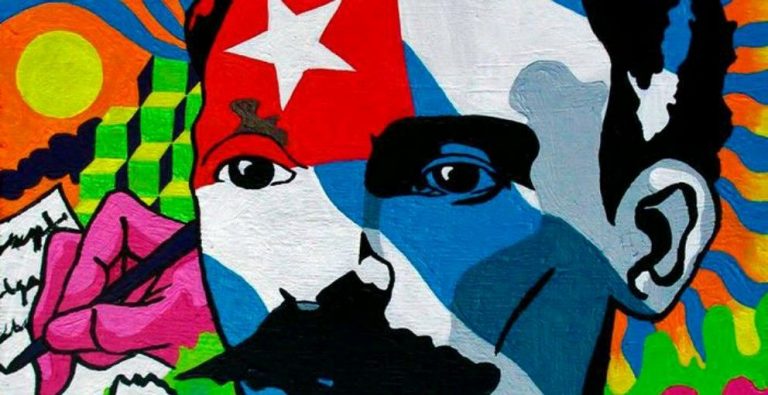
Born in Havana, Cuba, José Julián Martí y Pérez was the son of poor Spanish immigrants.
I WHO LIVE THOUGH I HAVE DIED
JOSÉ MARTÍ
I who live though I have died,
Claim of being a great discoverer,
For last night I found out that
Love is the best remedy.
When weighed by the cross,
A man resolves to give his life,
He does all the good he can, and returns
Bathed in the light.
***
YO QUE VIVO
AUNQUE ME HE MUERTO
Yo que vivo, aunque me he muerto,
Soy un gran descubridor,
Porque anoche he descubierto
La medicina de amor.
Cuando al peso de la cruz
El hombre morir resuelve,
Sale a hacer bien, lo hace, y vuelve
Como de un baño de luz.
***
José Martí [1853-1895]
Born in Havana, Cuba, José Julián Martí y Pérez was the son of poor Spanish immigrants.
Thanks to the aid of his teacher, he was able to go to high school just at the time the Ten Years’ War, Cuba’s first struggle for independence, began.
Martí quickly committed himself to the cause, publishing his first newspaper, La Patria Libre, in 1869.
Soon he was arrested for denouncing a pro-Spanish classmate and was sentenced to six years of hard labor.
Freed after only a few months, Martí began the exile that would characterize the better part of the rest of his life.
He went to Spain where he published El presidio político en Cuba, a rousing attack on Cuban prisons.
He received his university education in Madrid and Zaragoza and then returned to the Americas.
From 1881 until his fateful return to Cuba in 1895, Martí spent much of his time in New York. He reported on life in the United States for many newspapers in Latin America including La Nación.
He wrote everything from a magazine for children (Edad de Oro) to poetry (Versos sencillos, 1891), to essays on the nature of the United States which he admired for its energy and industry as well as its notable statesmen, particularly the framers of the Constitution.
However, he denounced its imperialist attitude toward its southern neighbors.
Yet, despite his busy literary career, he spent much of his time planning the second Cuban struggle for independence.
He insisted that the next war should be short (to avoid U.S. intervention) and fought with a “republican method and spirit”.
In 1892 he founded the Cuban Revolutionary Party to organize the coming struggle. By early 1895, his preparations were complete. He would set sail with the generals from the last struggle and considerable supplies from Florida.
Then, U.S. authorities seized the ships just as they were about to set sail. Martí arrived in Cuba without any special authority and no way to keep the generals in check. He was killed in a small skirmish not even two weeks after he had arrived.
It was only in the 1920’s and 1930’s that Martí was embraced by a new generation of nationalist Cubans as “el apóstol”.
As the great Nicaraguan poet Rubén Darío noted, Martí belonged to “an entire race, an entire continent.”
____________________
Andry-Andreja Jakus, a Professor at Hacettepe University, Zagreb, Croatia, is Academic Writer, Bibliographer, Lexicographer, Translator, Language Tutor and Reviewer. In her columns, she writes on poetry, philosophy, cultural studies, history of religions etc.
Courtesy: Andry-Andreja Jakus/LinkedIn – Published with permission of the author